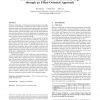Free Online Productivity Tools
i2Speak
i2Symbol
i2OCR
iTex2Img
iWeb2Print
iWeb2Shot
i2Type
iPdf2Split
iPdf2Merge
i2Bopomofo
i2Arabic
i2Style
i2Image
i2PDF
iLatex2Rtf
Sci2ools
106
click to vote
ASPLOS
2010
ACM
2010
ACM
ConMem: detecting severe concurrency bugs through an effect-oriented approach
Multicore technology is making concurrent programs increasingly pervasive. Unfortunately, it is difficult to deliver reliable concurrent programs, because of the huge and non-deterministic interleaving space. In reality, without the resources to thoroughly check the interleaving space, critical concurrency bugs can slip into production runs and cause failures in the field. Approaches to making the best use of the limited resources and exposing severe concurrency bugs before software release would be desirable. Unlike previous work that focuses on bugs caused by specific interleavings (e.g., races and atomicity-violations), this paper targets concurrency bugs that result in one type of severe effects: program crashes. Our study of the error-propagation process of realworld concurrency bugs reveals a common pattern (50% in our non-deadlock concurrency bug set) that is highly correlated with program crashes. We call this pattern concurrency-memory bugs: buggy interleavings directly ca...
ASPLOS 2010 | Concurrency Bugs | Concurrency-memory Bugs | Programming Languages | Severe Concurrency Bugs |
| Added | 17 May 2010 |
| Updated | 17 May 2010 |
| Type | Conference |
| Year | 2010 |
| Where | ASPLOS |
| Authors | Wei Zhang, Chong Sun, Shan Lu |
Comments (0)

